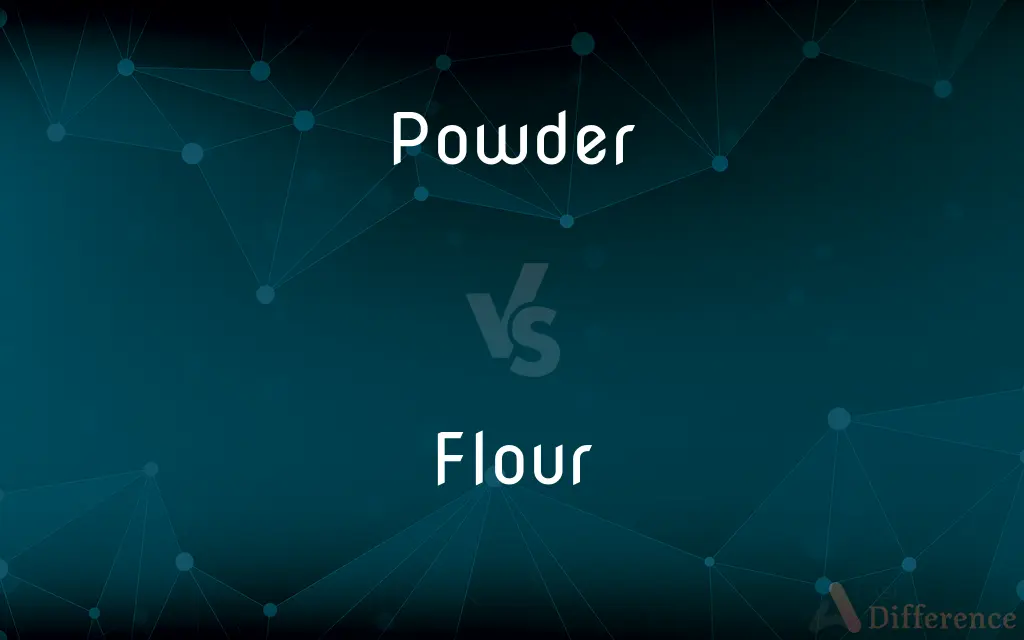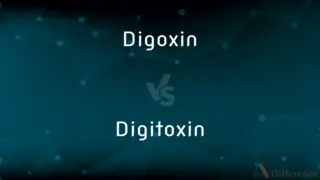Powder vs. Flour — What's the Difference?
Edited by Tayyaba Rehman — By Fiza Rafique — Updated on September 28, 2023
Powder is a fine, dry substance typically produced by crushing or grinding. Flour is a powder made by grinding raw grains or roots.

Difference Between Powder and Flour
Table of Contents
ADVERTISEMENT
Key Differences
Powder and flour, while sharing similarities in their texture, have distinct applications and sources. Powder, a term with broad usage, can be derived from various substances, be it minerals, chemicals, or plant-based. Flour, on the other hand, specifically refers to the fine substance obtained from grinding grains, legumes, or certain roots.
In culinary arts, both powder and flour play pivotal roles. Common powders in a kitchen might include baking powder or cocoa powder. Flour, being a staple in many cuisines, is often associated with bread-making, pastry preparation, and as a thickening agent. Its most common source is wheat, though flours from almonds, rice, and chickpeas are becoming increasingly popular.
The manufacturing process for both powder and flour involves grinding, but the end goals differ. When producing a powder, the aim might be to achieve a specific consistency, particle size, or to isolate certain compounds. Flour production, conversely, is usually about retaining the nutritional and functional properties of the source grain or root.
In the context of purchasing, powders and flours are often packaged differently due to their uses. You might find cosmetic powders in small compacts, while cleaning powders could be in larger containers. Flour, given its culinary roots, is typically sold in bags, with labels indicating its source, such as "whole wheat" or "rye".
Comparison Chart
Source
Various (minerals, plants, chemicals)
Grains, legumes, roots
ADVERTISEMENT
Usage
Broad (culinary, cosmetic, cleaning)
Primarily culinary
Production Process
Grinding with varied end goals
Grinding to retain nutritional properties
Packaging
Varies (compacts, containers, sachets)
Typically in bags
Examples
Baking powder, talcum powder, detergent powder
Wheat flour, rice flour, almond flour
Compare with Definitions
Powder
A finely ground, dry substance.
The artist used a colored powder to create the vibrant mural.
Flour
The main ingredient in many pastries and bread.
The recipe called for two cups of all-purpose flour.
Powder
A substance that is sprinkled or applied in its fine granulated form.
She applied some face powder before the photoshoot.
Flour
A staple ingredient in baking and cooking.
She sifted the flour to ensure her cake was light and airy.
Powder
A dry, bulk substance in particulate form.
The laundry powder effectively removed the stains.
Flour
A product produced in various varieties like whole wheat, rye, or oat.
For a healthier option, she used almond flour in her cookie recipe.
Powder
A cosmetic substance to give texture or color.
The highlighter powder gave her cheeks a subtle shimmer.
Flour
Flour is a powder made by grinding raw grains, roots, beans, nuts, or seeds. Flours are used to make many different foods.
Powder
A powder is a dry, bulk solid composed of many very fine particles that may flow freely when shaken or tilted. Powders are a special sub-class of granular materials, although the terms powder and granular are sometimes used to distinguish separate classes of material.
Flour
A powder obtained by grinding grain, typically wheat, and used to make bread, cakes, and pastry.
Powder
A substance consisting of ground, pulverized, or otherwise finely dispersed solid particles.
Flour
Sprinkle (something, especially a work surface or cooking utensil) with a thin layer of flour.
Powder
Any of various preparations in the form of powder, as certain cosmetics and medicines.
Flour
Grind (grain) into flour.
Powder
A dry explosive mixture, such as gunpowder.
Flour
A fine, powdery foodstuff obtained by grinding and sifting the meal of a grain, especially wheat, used chiefly in baking.
Powder
Light dry snow.
Flour
Any of various similar finely ground or powdered foodstuffs, as of cassava, chickpeas, or bananas.
Powder
To turn into or produce as a powder
Tea that is powdered.
Flour
A soft, fine powder.
Powder
To put powder on
Powdered the cake with sugar.
Flour
To cover or coat with flour.
Powder
To strew or ornament with small objects or flecks
The stars powdered the sky.
Flour
To make into flour.
Powder
The fine particles which are the result of reducing a dry substance by pounding, grinding, or triturating, or the result of decay; dust.
Flour
Powder obtained by grinding or milling cereal grains, especially wheat, or other foodstuffs such as soybeans and potatoes, and used to bake bread, cakes, and pastry.
Powder
(cosmetics) A mixture of fine dry, sweet-smelling particles applied to the face or other body parts, to reduce shine or to alleviate chaffing.
Flour
The food made by grinding and bolting cleaned wheat (not durum or red durum) until it meets specified levels of fineness, dryness, and freedom from bran and germ, also containing any of certain enzymes, ascorbic acid, and certain bleaching agents.
Powder
An explosive mixture used in gunnery, blasting, etc.; gunpowder.
Flour
Powder of other material.
Wood flour, produced by sanding wood
Mustard flour
Powder
(informal) powder snow; light, dry, fluffy snow.
Flour
Obsolete form of flower
Powder
Ellipsis of powder blue; the colour powder blue.
Flour
(transitive) To apply flour to something; to cover with flour.
Powder
(transitive) To reduce to fine particles; to pound, grind, or rub into a powder.
Flour
(transitive) To reduce to flour.
Powder
(transitive) To sprinkle with powder, or as if with powder.
To powder one's hair
Flour
(intransitive) To break up into fine globules of mercury in the amalgamation process.
Powder
(intransitive) To use powder on the hair or skin.
Flour
The finely ground meal of wheat, or of any other grain; especially, the finer part of meal separated by bolting; hence, the fine and soft powder of any substance; as, flour of emery; flour of mustard.
Powder
(intransitive) To turn into powder; to become powdery.
Flour
To grind and bolt; to convert into flour; as, to flour wheat.
Powder
To sprinkle with salt; to corn, as meat.
Flour
To sprinkle with flour.
Powder
To depart suddenly; to "take a powder".
Flour
Fine powdery foodstuff obtained by grinding and sifting the meal of a cereal grain
Powder
The fine particles to which any dry substance is reduced by pounding, grinding, or triturating, or into which it falls by decay; dust.
Grind their bones to powder small.
Flour
Cover with flour;
Flour fish or meat before frying it
Powder
An explosive mixture used in gunnery, blasting, etc.; gunpowder. See Gunpowder.
Flour
Convert grain into flour
Powder
To reduce to fine particles; to pound, grind, or rub into a powder; to comminute; to pulverize; to triturate.
Flour
A fine powder obtained by grinding grains or roots.
Bread is primarily made from wheat flour.
Powder
To sprinkle with powder, or as with powder; to be sprinkle; as, to powder the hair.
A circling zone thou seestPowdered with stars.
Flour
A thickening agent used in soups and sauces.
To prevent lumps, she mixed the flour with cold water before adding it to the gravy.
Powder
To sprinkle with salt; to corn, as meat.
Powder
To be reduced to powder; to become like powder; as, some salts powder easily.
Powder
To use powder on the hair or skin; as, she paints and powders.
Powder
A solid substance in the form of tiny loose particles; a solid that has been pulverized
Powder
A mixture of potassium nitrate, charcoal, and sulfur in a 75:15:10 ratio which is used in gunnery, time fuses, and fireworks
Powder
Any of various cosmetic or medical preparations dispensed in the form of a powder
Powder
Apply powder to;
She powdered her nose
The King wears a powdered wig
Powder
Make into a powder by breaking up or cause to become dust;
Pulverize the grains
Powder
A medicinal or other preparation in pulverized form.
The pharmacist recommended taking the medicine in powder form for faster absorption.
Common Curiosities
What is the main difference between powder and flour?
Powder can refer to any finely ground substance, while flour is specifically from ground grains or roots.
Are all powders edible?
No, many powders like talcum or detergent are not safe for consumption.
Is flour used in cosmetics?
Rarely, though rice flour might be used in some Asian cosmetics.
Why is baking powder called a powder and not flour?
Baking powder, a leavening agent, is a mix of various ingredients and not solely ground grain.
What's the most common type of flour?
Wheat flour is widely used worldwide.
Can all grains be turned into flour?
Theoretically, yes, but some grains like wheat, rice, and corn are more commonly used.
How is powder created?
It's made by grinding and crushing materials into a fine consistency.
Are there gluten-free flours?
Yes, examples include almond flour, coconut flour, and rice flour.
Why is powder used in cosmetics?
Powders can set makeup, provide coverage, or add color.
Can flour go bad?
Yes, especially if exposed to moisture or pests.
Are powdered drinks considered a type of powder?
Yes, they're in powdered form and can be dissolved in liquid.
Why is flour important in baking?
Flour provides structure and body to baked goods.
Can you substitute one powder for another in recipes?
It depends on the powders and the recipe. Some may be interchangeable, but not all.
Can flour be made at home?
Yes, with the right tools, grains or nuts can be ground into flour.
Can both powder and flour be used for thickening?
While flour is common for thickening, certain powders like cornstarch can also serve this purpose.
Share Your Discovery

Previous Comparison
Digoxin vs. Digitoxin
Next Comparison
Smart vs. GeniusAuthor Spotlight
Written by
Fiza RafiqueFiza Rafique is a skilled content writer at AskDifference.com, where she meticulously refines and enhances written pieces. Drawing from her vast editorial expertise, Fiza ensures clarity, accuracy, and precision in every article. Passionate about language, she continually seeks to elevate the quality of content for readers worldwide.
Edited by
Tayyaba RehmanTayyaba Rehman is a distinguished writer, currently serving as a primary contributor to askdifference.com. As a researcher in semantics and etymology, Tayyaba's passion for the complexity of languages and their distinctions has found a perfect home on the platform. Tayyaba delves into the intricacies of language, distinguishing between commonly confused words and phrases, thereby providing clarity for readers worldwide.
















































